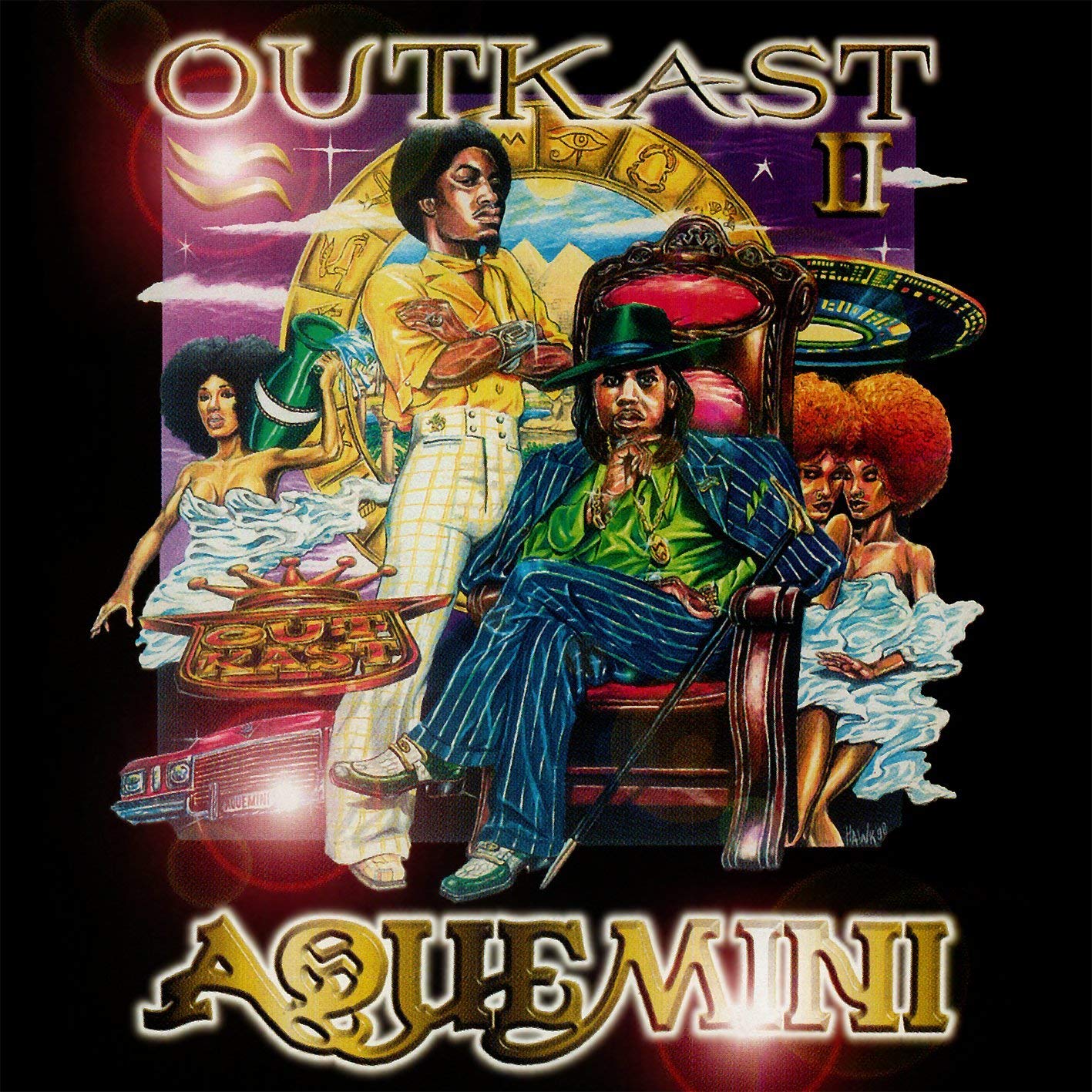OutKast’s ‘Aquemini’ turns 20

OutKast
Aquemini
LaFace Records · August 1998
Throughout hip hop history, a narrative of innovation and trailblazing has been both heavily encouraged and criticized. While some have been applauded for their ability to blur the lines between genres and pioneer completely new categories of rap, others have been shunned from the hip hop and music community for not “sticking to the status quo” and joining the dominant sound at the time. Never was this dichotomy clearer than on September 29th, 1998, when the rap group OutKast, consisting of high school friends Antwan “Big Boi” Patton and André “André 3000” Benjamin released their 3rd studio album Aquemini.
At a time when gangsta rap was king of the hip hop industry, and glorified tales of drugs, women, and violence were all that could be found on the radio, OutKast relied on coloring outside of the lines to achieve critical and commercial success. Hailing from Atlanta, GA, OutKast’s rise to the top of hip hop stardom was met with heavy backlash from the very beginning, as they did not emerge from Los Angeles or New York. However, after the profound success of their first two albums Southernplayalisticadillacmuzik and ATLiens in 1994 and 1996 respectively, the group found themselves in a lane of their own. As 1998 rolled around André 3000 and Big Boi were in a position to expand on their creative talents and experimentation that had made them a household name.
Aquemini is a combination of Big Boi’s Aquarius and André’s Gemini Zodiac signs, and was the first album ofwhich the majority was produced solely by André and Big Boi. André handled the production onmost of the tracks while Big Boi wrote thelyrics and hooks. Stylistically, the album expands on ATLiens’ spaceyand extraterrestrial feel, while still containing songs with fun, bouncy beats that can keep up with any other in a club. Lyrically, Aquemini focuses on numerous themes relating to the human experience, with André 3000 focusing more on distinctly unorthodox topics (this was inspired by his budding relationship with Erykah Badu at the time). Big Boi, on the other hand, focuses on maintaining a “player” image and playing into many of the themes prevalent in hip hop at the time. Throughout the album, OutKast uses precise and powerful storytelling techniques that paint vivid images in the listener’s mind. On ‘Rosa Parks,’ the hit single that peaked at #55 on the Billboard Hot 100, the group uses the oppression and discrimination imposed on Rosa Parks and other Civil Rights leaders during the 1950s and 60s and relate it to their experiences being ostracized in the rap world for their different sound and style. On ‘Da Art of Storytellin’ (Part 1),’ a song later sampled by the likes of J. Cole, OutKast remembers old childhood friends lost to drugs and crime, and recounts them in such a way that by the end, the listener is inclined to feel the same emotions and sadness expressed by André and Big Boi.
The album is 16 tracks and runs just short of an hour and fifteen minutes long. Even in 2018, we can see the impact and influence that Aquemini brought into the rap universe. This hip hop album is unique in a sense that it incorporates the usage of live instruments throughout; including guitars, pianos, and most notably a harmonica solo from André 3000’s stepfather in ‘Rosa Parks.’ Aquemini made waves for its fearlessly innovative sound and ability to stand out in the genre at a time where East and West Coast-based mafioso rap was at its peak. The album also calls upon many talented artists who come on as features including George Clinton, Cee-Lo Green, and Raekwon of the Wu-Tang Clan, showcasing the duo’s ability to mesh perfectly with rappers from any region or style. Heavily praised upon its release by both major publications (with The Sourcegiving it a famed five-mic rating) and the general public, Aquemini silenced all those who sought to write off OutKast as too “weird” or “strange” for hip hop. Being a very masculine and braggadocious culture, many were skeptical of embracing characters like André 3000 and Big Boi, the former of whom would dawn flamboyant clothing, wigs, and oversized sunglasses in public around the time of Aquemini’s release.
20 years later, Aquemini stands as a testament to creative freedom and expression in a genre constantly concerned with establishing a dominant sound. Hip hop has grown a lot since 1998, but to this day André 3000 and Big Boi can be seen influencing music with this classic album. By rapping about real affections that can connect to a large audience and focusing on a more genuine, fluid sound, Aquemini paved the way for some of the most groundbreaking and unique artists that flood our streaming playlists today.